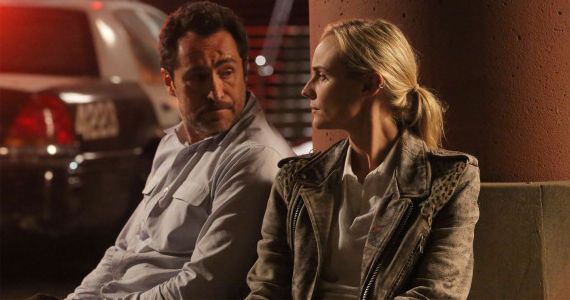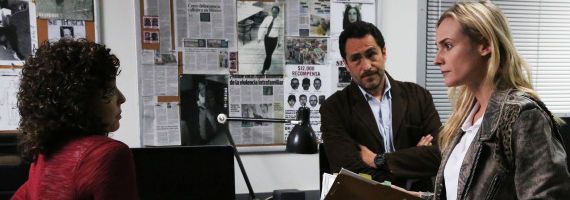Let's face it, as television characters men - and in particular, the male anti-hero - have it pretty easy. It seems like they're always running around doing whatever they please, with or to whomever they please, and through it all there's rarely a glimpse of consequence, aside from a perpetually disapproving wife. There was a time, not so long ago, when audiences ate that kind of character depiction up; they couldn't get enough of guys like Tony Soprano, Don Draper -and of course, Walter White - and so production slates became crammed with shows revolving around various spins on the same theme.
But now, the anti-hero is circling the slow drain to self-parody and in 'Vendetta,' The Bridge slyly points the finger at a few classic male anti-hero tropes (and men behaving badly in general) as the impetus for many of the disturbing actions of the show's central killer - whose identity is finally revealed to be that of seemingly mild-mannered school teacher and apparent fan of Under the Dome, Kenneth Hasting. The episode takes the show's love of coincidence and convenient twists of fate and, in its own weird way, turns them into something resembling a critical commentary of another text; particularly on the role and prevalence of the male do-anything-he-wants anti-hero, by collectively demonstrating that certain actions commonly committed by such a character can have incredibly dire consequences.
For its part, the show plays host to several characters who could easily be (and, in their minds, probably are) the main character of their own "prestige drama" – e.g., the bleak cop show; the bleak drug-addled-journalist show; the bleak mumble-mouthed-savior-of-embattled-women show – complete with Wolverine-esque sideburns and gif-tastic burbles of "Oh, dear," after a pre-dawn game of Toss the Dead Body ends rather noisily – or, a somewhat funny (but still plenty bleak) dude-from-Tampa-running-guns show.
In that regard, Marco Ruiz, Daniel Frye, Steven Linder and especially Bro-master General Ray all exhibit various qualities that make them card carrying members of the Male Anti-Hero Club. And though half of them have nothing directly to do with the Kenneth Hasting/David Tate fiasco, the episode deliberately demonstrates the cost of the devil-may-care attitude of these men and others.
What's interesting is the way 'Vendetta' illustrates how the choices these characters have made, the small, unlikable aspect that gives them some depth, has ultimately constructed the dark and violent narrative in which they now find themselves. Marco, Daniel and the recently introduced (and dispatched) Santi Jr. have all played a role – some more integrally than others – in the creation of a monster. And, for Marco, at least, his penance begins with the realization that his family isn't the only one that suffers when he is unfaithful.
And, by converging on the action-movie trope of putting the hero's wife in danger, the entire episode constitutes a weird, sometimes clumsy hour of television that is also fascinating to watch, as (almost) everything starts to come together around one man's understanding of his own culpability in a horrific situation. And that recognition seems to suggest that maybe what the world (and the world of TV) needs are more Sonyas and fewer Marcos.
_____
The Bridge continues next Wednesday with 'The Beetle' @10pm on FX.
Photos: Byron Cohen/FX


